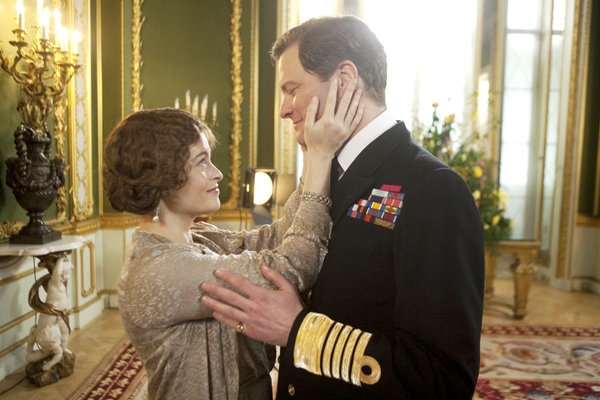Movie review by Greg Carlson
While watching “The King’s Speech,” one might occasionally wonder what present monarch Queen Elizabeth II would think of Colin Firth’s portrayal of her father Albert Frederick Arthur George, better known as King George VI to the world, and Bertie to his immediate family. Dashing movie actors have a tendency to abet filmdom’s fantasy reconstruction of history, and Firth’s handsome face provides only the first clue that movies tend to do more than simply cut out all the boring bits.
Stately and dignified if not always majestic, “The King’s Speech” inverts “Pygmalion,” stripping it of George Bernard Shaw’s keenest satire in favor of a more superficial “crowned heads are people too” theme that played just as well in Stephen Frears’s “The Queen.” Focused on the eradication of Bertie’s prominent stammer, the story traces the relationship of the royal to his Australian speech therapist Lionel Logue, played with relish by Geoffrey Rush. Commoner Logue’s unorthodoxy and insistence on informality initially vex the stiff noble, but positive results and a requisite amount of dramatic conflict cement the unlikely friendship.
Bertie is both a hesitant patient/client/pupil and a reluctant ruler, and director Tom Hooper bounces back and forth between scenes of often humorous therapeutic techniques, including one that requires the liberal application of salty profanity, and the succession crisis initiated by brother Edward VIII (Guy Pearce), who abdicated when his proposed marriage to American Wallis Simpson met with stern political rebuke. A few sticklers have criticized the narrative streamlining that suggests a much tighter cause-and-effect chronology for George VI’s public speaking remedy, but there is no question that dramatically, “The King’s Speech” works best during the scenes exclusive to Firth and Rush.
The two actors capitalize on the gulf of wealth and privilege that divides their characters from one another, and Rush’s barbs earn numerous laughs as he skewers pomposity and protocol without personally offending His Highness. When Logue finally does overstep, the tension created by Bertie’s cold shoulder gives the film its strongest jolt. On multiple occasions, David Seidler’s screenplay suggests that Logue’s lack of deference was a deliberate ploy to trigger a commanding response from the usually taciturn Bertie. The fantastic image of Rush casually slouched in King Edward’s Chair, the seat of coronation for all but two British sovereigns since 1308, offers the most visually arresting example.
Hooper might have done more to emphasize the transformative influence of the media as a conduit between governors and governed, and a few moments in “The King’s Speech” hint at the seismic impact of widely distributed sound and vision on the masses during the ascendancy of radio transmission and film distribution. In one suggestive scene, a newsreel of Hitler delivering a fiery oration impresses Bertie, who recognizes that his own speech skills pale by comparison. Once Hooper has set the stage for the predictably triumphant climax, the broadcast of King George’s September 3, 1939 address in the wake of declared war with Germany, most viewers will be ready to hang on every word. The curious might even make time to visit YouTube or the BBC’s online archive to hear the actual recording.
